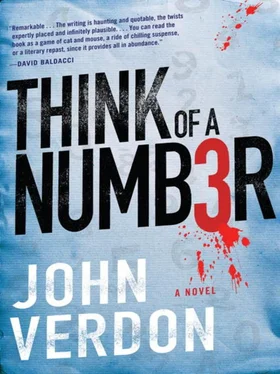Gurney was no longer surprised at the man’s officiousness, but it still rankled. He glanced around the table, achieving eye contact with all but his guide at the murder site, who was flipping noisily through his packet of papers, and Stimmel, the DA’s chief assistant, who sat gazing into space like a contemplative toad.
“As the captain indicated, there’s a lot to cover. It might be best to let me give you a summary of the events in the order in which they occurred, and to hold your questions until you have the whole story.” He saw Rodriguez’s head rising to object, then subsiding the instant Kline nodded approvingly at the proposed procedure.
In his clear, concise way (he’d been told more than once that he could have been a professor of logic) Gurney gave a twenty-minute summary of the affair-beginning with Mellery’s e-mail asking to see him, proceeding through the series of disconcerting communications and Mellery’s reactions, concluding with the phone call from the killer and the note in the mailbox (the one mentioning the number nineteen).
Kline was a rapt listener throughout and the first to speak when it ended. “It’s an epic revenge story! The killer was obsessed with getting even with Mellery for something horrible he did years ago when he was drunk.”
“Why wait so long?” asked Sergeant Wigg, whom Gurney was finding more interesting each time she spoke.
Kline’s eyes were bright with possibilities. “Maybe Mellery revealed something in one of his books. Maybe that’s how the killer discovered he was responsible for some tragic event he hadn’t connected with him before. Or maybe Mellery’s success was the last straw, the thing the killer couldn’t stand. Or maybe, like the first note said, the killer just happened to see him on the street one day. A smoldering resentment comes back to life. The enemy steps into the crosshairs and… bang!”
“Bang, my ass,” said Hardwick.
“You have a different opinion, Senior Investigator Hardwick?” inquired Kline with an edgy smile.
“Carefully composed letters, number mysteries, directions to send a check to the wrong address, a series of increasingly threatening poems, hidden messages to the police that could only be discovered through latent-prints chemistry, surgically clean cigarette butts, a concealed gunshot wound, an impossible trail of footprints, and a fucking lawn chair for Chrissake! That’s a hell of a dragged-out bang.”
“My sketch of the situation was not meant to exclude premeditation,” said Kline. “But at this point I’m more interested in the basic motive than in details. I want to understand the connection between the murderer and his victim. Understanding the connection is usually the key to a conviction.”
This lecturing response generated an unpleasant silence, broken by Rodriguez.
“Blatt!” he barked at Gurney’s guide, who was staring at his copies of the first two messages as though they’d dropped into his lap from outer space. “You look lost.”
“I don’t get it. The perp sends a letter to the victim, tells him to think of a number and then look in a sealed envelope. He thinks of six fifty-eight, looks in the envelope, and there it is-six fifty-eight. You saying that actually happened?”
Before anyone could answer, his partner broke in, “And two weeks later the perp does it again-this time on the phone. He tells him to think of a number and look in his mailbox. Victim thinks of the number nineteen, looks in his mailbox, and there’s the number nineteen in the middle of a letter from the perp. That’s some pretty weird shit, dude.”
“We have the recording the victim made of the actual phone call,” said Rodriguez, making it sound like a personal achievement. “Play the part about the number, Wigg.”
Without comment the sergeant tapped a few keys, and after a two- or three-second interval the call between Mellery and his stalker-the one Gurney had audited via Mellery’s conference-call gizmo-began at its midpoint. The faces at the table were riveted by the bizarre accent of the caller’s voice, the taut fear in Mellery’s.
“Now, whisper the number.”
“Whisper it?”
“Yes.”
“Nineteen.”
“Good, very good.”
“Who are you?”
“You still don’t know? So much pain, and you have no idea. I thought this might happen. I left something for you earlier. A little note. You sure you don’t have it?”
“I don’t know what you’re talking about.”
“Ah, but you knew that the number was nineteen.”
“You said to think of a number.”
“But it was the right number, wasn’t it?”
“I don’t understand.”
After a moment Sergeant Wigg tapped two keys and said, “That’s it.”
The brief playback left Gurney feeling bereaved, angry, sick.
Blatt turned his palms up in a gesture of confusion. “What the hell was that, a man or a woman?”
“Almost certainly a man,” said Wigg.
“How the hell can you tell?”
“We did a voice-pitch analysis this morning, and the printout shows more stress as the frequency rises.”
“So?”
“The pitch varies considerably from phrase to phrase, even word to word, and in every case the voice is measurably less stressed at the lower frequencies.”
“Meaning the caller was straining to speak in a high register and the lower pitches came more naturally?” asked Kline.
“Exactly,” said Wigg in her ambiguous but not unattractive voice. “It’s not conclusive evidence, but it’s strongly suggestive.”
“What about the background noise?” asked Kline. It was a question on Gurney’s mind as well. He’d been aware of a number of vehicle sounds on the recording that placed the source of the call in an open area-perhaps a busy street or an outdoor mall.
“We’ll know more after we do an enhancement, but right now there seem to be three categories of sound-the conversation itself, traffic, and the hum of some sort of engine.”
“How long will the enhancement take?” asked Rodriguez.
“Depends on the complexity of the data captured,” said Wigg. “I’d estimate twelve to twenty-four hours.”
“Make it twelve.”
After an awkward silence, something Rodriguez had a talent for initiating, Kline asked a question of the room in general. “What about that whispering business? Who wasn’t supposed to hear Mellery say the number nineteen?” He turned to Gurney. “You have any ideas?”
“No. But I doubt it has anything to do with not being overheard.”
“Why would you say that?” challenged Rodriguez.
“Because whispering is a lousy way of not being overheard,” whispered Gurney, quite audibly, to underline his point. “It’s like other peculiar elements in the case.”
“Like what?” Rodriguez persisted.
“Well, for example, why the uncertainty in the note referring to November or December? Why a gun and a broken bottle? Why the mystery with the footprints? And one other small matter that no one’s mentioned-why no animal tracks?”
“What?” Rodriguez looked baffled.
“Caddy Mellery said that she and her husband heard the shrieking sounds of animals fighting behind the house-that was why he went downstairs and looked out the back door. But there were no animal tracks anywhere near there-and they would have been quite obvious in the snow.”
“We’re getting bogged down. I don’t see how the presence or absence of raccoon tracks, or whatever the hell we’re talking about, matters.”
“Christ,” said Hardwick, ignoring Rodriguez and shooting Gurney an admiring grin. “You’re right. There wasn’t a single mark in that snow that wasn’t made by the victim or the killer. Why didn’t I notice that?”
Читать дальше












